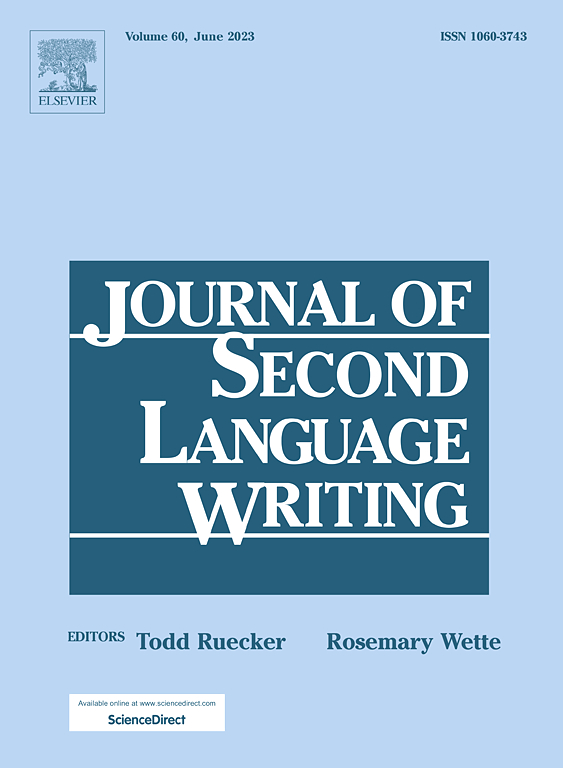放大意义相关修订的过程-产品关系:击键记录数据的微观分析方法
IF 4.5
1区 文学
Q1 LINGUISTICS
引用次数: 0
摘要
尽管迄今为止的许多写作研究表明,高水平和低水平的二语写作者有不同的写作行为,但对与意义相关的修改(与语法或格式的表面变化相比,影响文本含义的变化)以及这种修改是否以及如何对文本产生影响的研究相对较少。采用微观分析方法,本研究调查了6名青少年L1和L2英语作家的实时修改行为,这些行为是通过击键记录程序捕获的。该分析比较了两组之间的修订行为、语境(即地点)和方向(即焦点)的修订措施,并定性地检查了修订对增强文本演变的具体方式。研究结果显示,第二语言作者更多地关注地方层面的修改,而第一语言作者的修改更多地具有文本层面的影响(例如,连贯、论证)。在此基础上,我们讨论了使用击键记录数据作为诊断反馈来检查意义相关修改对文本影响的价值,并为第二语言写作课堂的教学和反馈活动提出建议。本文章由计算机程序翻译,如有差异,请以英文原文为准。
Zooming in on the process-product nexus of meaning-related revisions: A micro-analytic approach to keystroke logging data
While many writing studies to date show that higher-proficiency and lower-proficiency L2 writers have distinct writing behaviours, there is relatively little research into meaning-related revisions – changes which influence the meaning of the text as compared to surface-level changes related to grammar or format, and whether and how such revisions make a text-level impact. Taking a micro-analytic approach, the current study examined the real-time revision behaviours of six adolescent L1 and six adolescent L2 English writers, as captured by a keystroke logging programme. The analysis compared measures of revision behaviours and the context (i.e., location) and orientation (i.e., focus) of the meaningrelated revisions between the two groups, and examined qualitatively the specific ways the revisions do or do not contribute to enhancing the evolving text. Findings revealed that the L2 writers focused more on local-level revisions while the L1 writers’ revisions more often had a text-level impact (e.g., coherence, argumentation). Based on the findings, we discuss the value of examining the textual impact of meaning-related revisions using keystroke logging data for diagnostic feedback, and make recommendations for teaching and feedback activities in the L2 writing classroom.
求助全文
通过发布文献求助,成功后即可免费获取论文全文。
去求助
来源期刊

Journal of Second Language Writing
LINGUISTICS-
CiteScore
8.80
自引率
13.10%
发文量
50
审稿时长
59 days
期刊介绍:
The Journal of Second Language Writing is devoted to publishing theoretically grounded reports of research and discussions that represent a significant contribution to current understandings of central issues in second and foreign language writing and writing instruction. Some areas of interest are personal characteristics and attitudes of L2 writers, L2 writers'' composing processes, features of L2 writers'' texts, readers'' responses to L2 writing, assessment/evaluation of L2 writing, contexts (cultural, social, political, institutional) for L2 writing, and any other topic clearly relevant to L2 writing theory, research, or instruction.
 求助内容:
求助内容: 应助结果提醒方式:
应助结果提醒方式:


